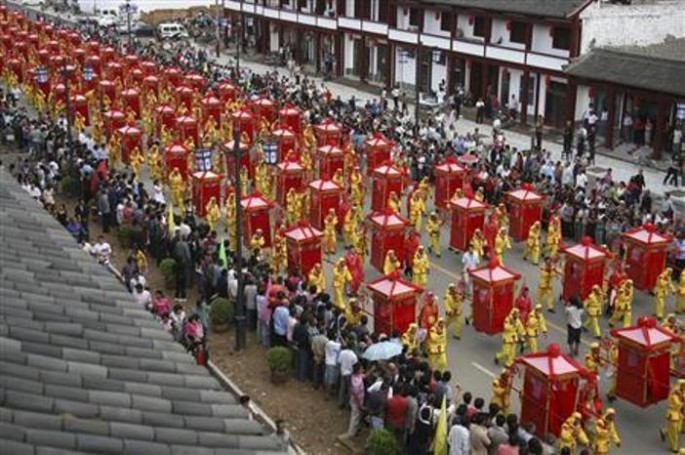While almost all marriages are expensive in many parts of the world--considering the cost of wedding celebrations and of setting up a new home--in China grooms face the added problem of having to pay a betrothal gift, usually in the form of cash, to offer to the bride's parents.
According to a report published by CRIENGLISH.com, this has become a problem for men in rural areas.
In Chinese culture, Caili or a betrothal gift must be given by a man to the bride's family after engagement to get married.
But the Caili tradition now has become more like a commercial transaction, placing a heavy financial burden on grooms, especially in rural areas, the report said.
According to Mr. Chen from Shangdong Province, a groom has to pay the minimum price of around 100,000 yuan ($15,320) to get married in China.
"Many grooms in Shandong's rural areas have to take a loan to marry their brides," Chen said. "They borrow 100 to 200 thousand yuan to pay the 'bride prices.' And that's just part of the Caili. The groom's family sometimes has to own a commercial property in the center of a county which on average costs over 4,000 yuan per square meter."
But having the money is not enough to ensure that a bachelor will find a good bride, the report added. In Henan Province, matchmakers often take into consideration a man's family background, education and appearance.
Zhang Yi, a researcher with the Chinese Academy of Social Sciences, said that the higher levels of Caili in China's rural areas were due to three main reasons.
Zhang explained: "First is the demographic structure--there are fewer women than men in China's rural areas. The competition in rural China's marriage market is getting more intense. That's also caused by migration--more and more women of marriageable age leave their homes to work in urban areas. Thirdly is the Caili culture itself, the bride's family would ask for more Caili to look good while the groom would pay more to show they are capable of marrying better brides."
According to the report, some bachelors, who do not have the financial means to secure a bride in rural China, seek the help of agencies in Vietnam, Cambodia and Myanmar to acquire a spouse, because it is cheaper there.
Zhang, however, believed that poverty in rural China is the real issue behind the rising Caili.
"In the process of urbanization, more and more people migrate from the countryside to the cities," Zhang noted. "Then rural areas become empty shells. With the aging population, we will see a bigger development gap between rural and urban areas. I think we need to find ways to narrow this gap. This is the real issue behind the rising Caili."
Zhang also predicted that in the next 10 years, bachelors in the rural areas will find it even more difficult to find a bride because of the gender imbalance and increasing competition in the marriage market.



























